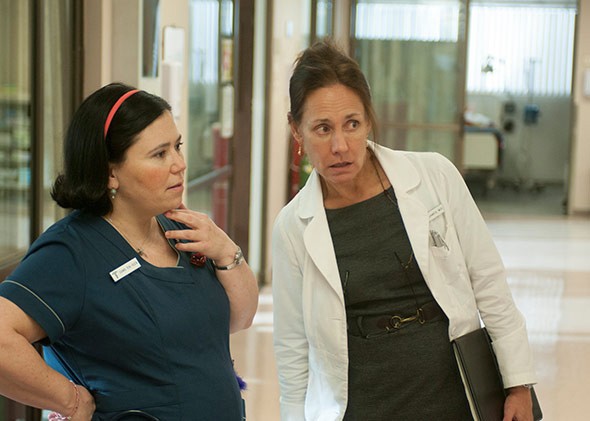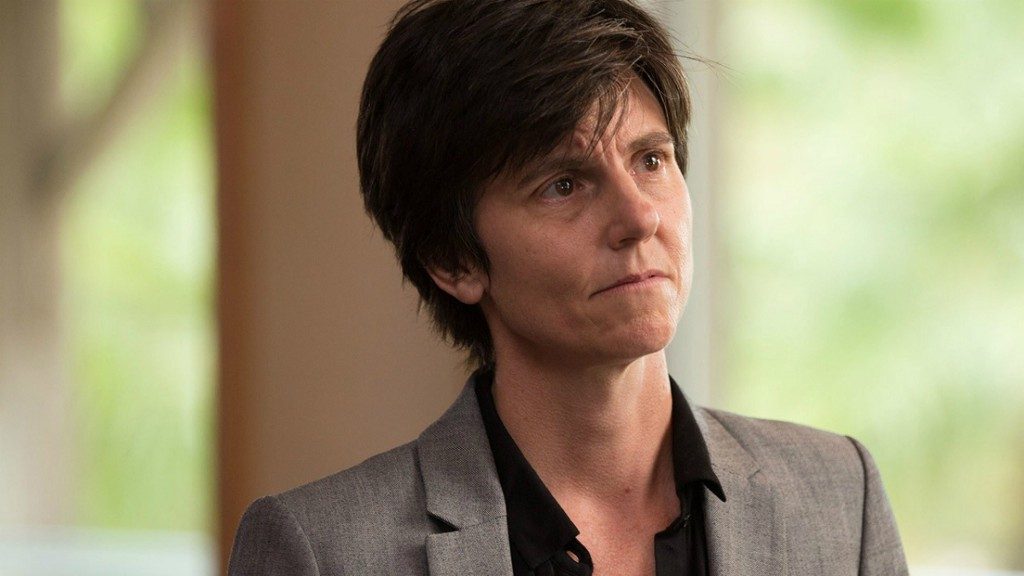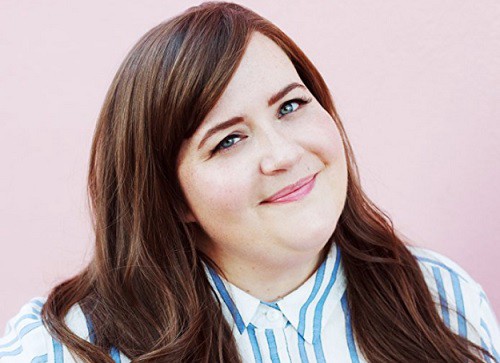HBO finally showed the terrifically unsentimental hospital sitcom Getting On some tender, loving care last week by renewing it for a second season. The network had previously disserved its most daring show with virtually no marketing push and a holiday-timed release (the six-episode debut season premiered just before Thanksgiving and concluded right after Christmas) that virtually ensured as few people would see it as possible.
Based on a UK sitcom and adapted for American audiences by Big Love showrunners Mark V. Olsen and Will Scheffer, Getting On stars a trio of comediennes at the top of their game: Alex Borstein (Family Guy), Laurie Metcalf (Roseanne), and Niecy Nash (Reno 911). They play the doctor (Metcalf) and nurses (Borstein and Nash) in the geriatric wing of a hospital — a place no one, including the patients, wants to be. I’ve written before about how this mordant (but never morbid) cringe comedy is a perfect cure for one of TV’s most offensive narrative crutch: hospital shows that serve as “self-centered, even self-helpy, universes where strangers suffer and die so doctors can learn life lessons.”
But on the joyous occasion of its hard-fought renewal, here’s five more reasons you should catch up on Getting On via HBO Go:
— It’s about women. Specifically, it’s about comfortably middle-aged women occupying different rungs of an office hierarchy, with all the social and interpersonal complications inherent to such circumstances. Overseeing a ward full of elderly women, Metcalf’s Dr. Jenna James and Nurses Dawn Forchette (Borstein) and DiDi Ortley (Nash) are people first and women second in this nearly single-gender environment. It’s a rare dynamic shared perhaps only by one other female-led show, Orange is the New Black.
There’s a big gap in status and power between Jenna, on the one hand, and Dawn and DiDi on the other. In the pilot episode, the discovery of a piece of turd on one of the hospital chairs leads to a battle of the wills: DiDi just wants to chuck it in the garbage, Dawn is adamant it be analyzed so she can discover who left it there, and Jenna wants it preserved for her fecal study — she’s on the cutting edge of that part of medical science that classifies poop into sixteen categories. There are times when Getting On plays out like a gray-haired version of Mean Girls: Despite their utter unlikeability, Dawn and Jenna are smart enough to know that office politics really just comes down to a neverending popularity contest for grown ups.
— It’s refreshingly unsentimental. Getting On’s center is Dawn, a single nurse in her late thirties or early forties whose best efforts to take care of others does nothing to alleviate her loneliness. As someone who sees death on a regular basis, Dawn is eager to carpe diem, but the show never lets her off easy. Though her scenes are handily stolen on the regular by Metcalf, Borstein is utterly compelling as the needy, spineless Dawn, who’s mediocre at her job and has a Pompeii-sized disaster for a personal life. The first season follows Dawn as she pursues an office romance with her overweight yuppie boss, Patsy de La Serda (Mel Rodriguez), with whom she initially pursues a colleagues-with-benefits relationship with and later falls for, even as she’s convinced the whole time that he’s gay.
— Laurie Metcalf. Jenna is no Dr. Caligari, but she’s certainly the physician you never want to have. Metcalf dominates every scene as an imperious, condescending, utterly tactless queen-bee wannabe who’s only tolerable because she’s humiliated as often as she’s doing the humiliating, especially by her charming, womanizer boss. Sometimes it seems that Jenna only got into medicine so she can tell underlings what to do (though, it should be added, she cares deeply about her poop research), but ultimately she’s just a cog herself. And because she knows that, it’s impossible to root against her, even when she says things like, “I couldn’t live without my Audi” in front of DiDi, who can’t afford to have a car.
— It’s an incisive critique of our health-care system. Kafka’s characters at least had the benefit of being told of their worthlessness with a stern face. Getting On’s characters get no such luxury, which is what makes the show such a great satire of corporate culture’s labyrinthine HR policies and “fuck you with a smile” service. Its critique is sharpest when it illustrates how a code of impersonal conduct doesn’t just lead to nothing getting done — the three-way stand-off over turd disposal, for example takes a couple of hours to resolve — but also gets in the way of people making real connections with their co-workers. Then there are Patsy’s Disney-derived “customer-friendly” initiatives, which attempt to turn the ward into a mall, complete with a gaudy, eight-foot-tall water fountain to maximize patient satisfaction. Of course it doesn’t take long for one of the women to fall into the fountain, because this is a world where there’s never enough dignity to go around.
— It never condescends to patients. Whatever their vast faults, Dawn, Didi, and Jenna’s work is supremely important: they provide, in the imperfect ways they know how, hope and care to ailing patients in the last years of their lives. Getting On gets this balance just right: these are pathetically human people distracted by their flailing personal lives and thwarted professional ambitions who end up mostly doing right by the people under the care. (They rarely heroes, though; one elderly marathon-runner goes home with a leg amputation when she catches a hospital-borne infection, while an Asian woman who doesn’t speak English is put through the wringer by Dawn’s cultural insensitivity.) But most importantly, the patients aren’t there to teach the staff anything. Though hardly developed to any great extent, they’re afforded the luxury of their own lives and concerns, even when they’re histrionically difficult, like Oscar nominee June Squibb’s racist and homophobic biddy. Getting On never bothers with the illusion that there’s anything but dentures and decrepitude that await us. But it also reminds us that it can be funny as hell getting there.







